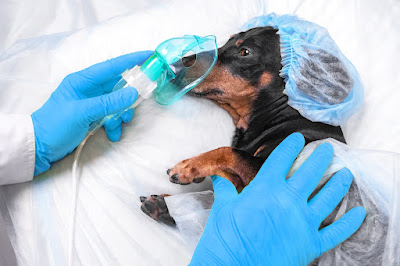Surgery can be extremely scary and stressful, even for the most prepared of patients. While there are many ways to help you and your loved ones prepare for a surgery, not everyone knows there are some great tactics to also help your pet prepare for (and recover from) a surgery. Ignorance may be bliss and knowing that your pet doesn’t have the anxiety that us humans do going into it can help give you peace of mind, but once they arrive the fear could kick in. Keep reading to learn some of the best tips and tricks to help prepare you and your pet for their surgery.
The week and days leading up to the surgery
Prior to any surgery, your veterinarian will send you home with instructions on how to best prepare in the week / days leading up to the surgery. The week before the event, you should review these instructions again carefully to ensure you’re ready for all the necessary steps. Sometimes these instructions include extra tests that need to happen prior to your pet going under general anesthesia and sometimes they can be as simple as when and what to eat in the hours beforehand.
Make sure to ask your veterinarian about what to do the night before your pet’s surgery so you can prep them accordingly. Things to ask about specifically include whether they should take any medication, if there are any changes to exercise you should implement, or if there are any changes in eating or drinking (amount, type, or even the time to cut off altogether). Make sure that you are following these instructions carefully, so you set your pet up for success on surgery day.
Prep your home for post-op
Not only is it important to prep your pet for the surgery, but you will also want to use this time to prepare your home for the days following the procedure. If you have multiple pets or rowdy children, you’ll want to ensure the space is calm and separate from any distractions and disruptions that could negatively impact their healing process. If you have a lot of stairs in your home, it may be a good idea to use a baby gate to discourage your pet from traveling up and down, or to pick a room with a door that closes so you can monitor them carefully. Finally, you’ll want to make sure all bedding that they will use is clean and washed to help lower the risk of any infections.
When in doubt, consult your veterinarian
While the instructions your veterinarian sends with you prior to the surgery will likely have all the information you need, it can still be a nerve-wracking time and it’s important that you are well-equipped to help your furry friend prepare and recover for this stressful event. Ask your veterinarian any questions you have about the days leading up and the days following the surgery and you’ll feel much more confident that you are providing the best care possible.
If you have any questions or are ready to schedule an appointment with the Bregman Veterinary Group, click here to get started. Whether you need to spay or neuter your pet, are looking for a veterinarian for your new pet or simply need to change practices, we are here to help!

